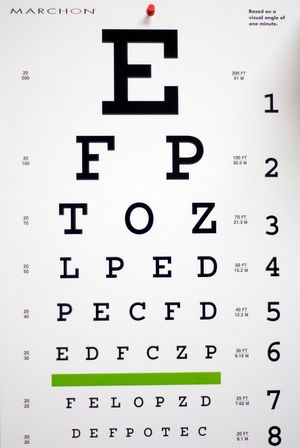Routine eye exams are important for everyone, young and old, even if you're healthy.
Comprehensive Eye Exams in Katy, TX
Our eye doctor Dr. Lorena Castaneda will examine your vision and if applicable will give you your prescription for corrective lenses like contacts or glasses; a comprehensive eye exam includes an assessment of how your eyes work together. Furthermore, we will also run common diagnostic tests for eye diseases to make sure nothing is missed. To learn the time saving tips before your eye exam, click here.
To evaluate the health of your eyes various procedures and tests give us an indication of your vision and other aspects of eye health. From simple tests such as reading the Snellen Big E eye chart to advanced evaluations with a high-powered lens to examine the health of the tissues inside of your eyes, you can rest assured we will do our best to keep you comfortable while providing an efficient and thorough eye exam.

Annual Children's Eye Exams
During childhood, regular check-ups are a part of growing up, and eye check-ups should be done every year too. Estimates suggest that up to 1/4 of all elementary school students have treatable vision problems, many of which are undetected. The AOA (American Optometric Association) guidelines say kids need eye exams at:
-
- 6 months
- 3 years
- before starting 1st grade
After that, kids with good vision should have their eyes examined every couple of years to monitor for changes that can happen as they grow and to keep an eye out for problems that can crop up and affect learning. Children who wear eyeglasses or contact lenses should have their eyes examined at least every 12 months or according to their eye doctor's instructions. Additionally, if there is a known eyesight problem or risk factor(s) for developing an eye condition, the child should get an eye exam every year. What are some common risk factors for vision problems? Premature birth, developmental delays, turned or crossed eyes, family history of eye disease, history of eye injury, other physical illness or disease. Read more about Pediatric Eye Exams here.
Adult Eye Exams at Optomedica Eye Consultants in Northwest Houston, TX
Glasses or contact lenses are worn by most adults, and they necessitate a yearly eye exam, according to the experts. The AOA concedes that if you have 20/20 vision and no risk factors for vision loss (like diabetes), you can wait two to three years between eye exams since your eyesight is less likely to change rapidly between the ages of 20 and 40. The exception to that rule: some systemic disorders are associated with increased risk for developing eye and vision problems - diabetes, high blood pressure, etc. - if so, you need an annual eye exam.
Over age 40, common age-related eye problems are more likely to surface. Presbyopia (requiring reading glasses), cataracts, and macular degeneration are among the most common. Best to have your eyes examined every one to two years to rule out these serious eye conditions and eye diseases, or to catch and treat them early. Read more about Vision After 40.
People who are 60 and older should have an annual eye exam because the risks for eye problems continue to rise with age. Read more about Vision After 60.
